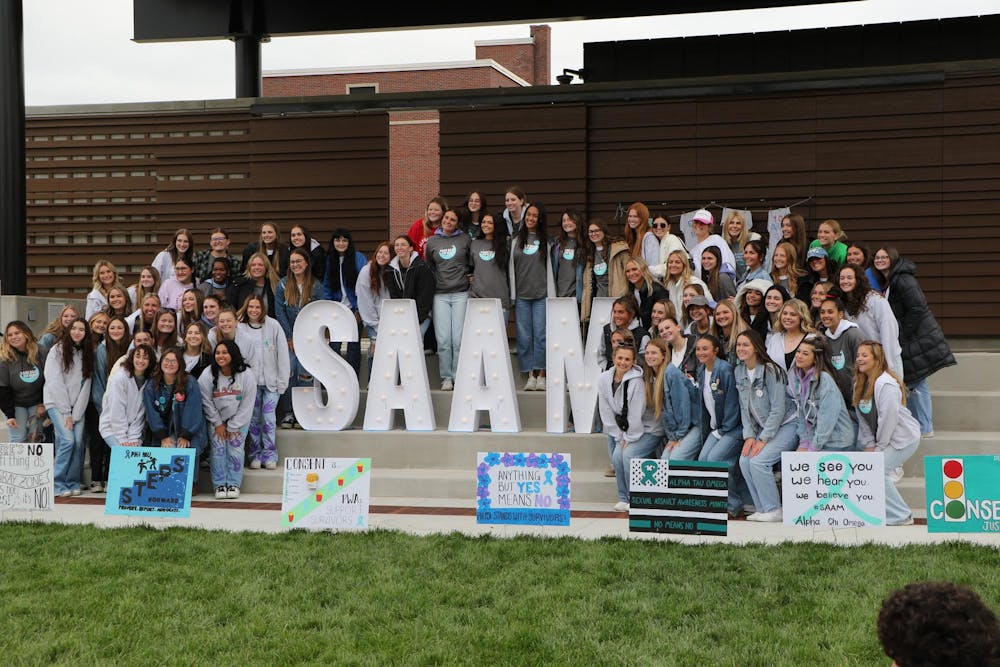The only thing that broke the silence at the Brown Family Amphitheatre April 24 was the voices of those who shared their stories of being sexually assaulted, and those who applauded them for having the courage to do so.
In honor of sexual assault awareness month, the Ball State Center for Survivor Support, Counseling Center, Greek life and Alpha Chi Omega (ACO) have been putting on various events to bring awareness to sexual victimization.
The Take Back the Night event included booths with various resources Ball State offers to support victims and survivors of sexual assault. Multiple people went on stage to speak about their personal experiences with being sexually assaulted and stressed the importance of addressing this issue.
ACO is heavily involved in sexual assault awareness and education. Rylan Wasson, second-year Ball State risk management insurance major and vice president of philanthropy for ACO said a lot of people don’t realize how often sexual assault occurs.
“Nobody realizes exactly how [frequently] this happens until they see their friends get up there and share a story that they never realized happened to them,” Wasson said.
Wasson said Greek Life has a reputation for being a place where people are likely to be sexually assaulted. She said this event will help make members of Greek Life more aware of how often sexual assault happens.
“People are a lot more cognizant about how they act towards women [because of Take Back the Night],” Wasson said. “It brings awareness in general about intervening [and] bystanders [it provides information on] how people can help.”
Dr. Brittany Acquaviva, assistant professor of criminal justice, teaches a victimology class where the topic of sexual assault is frequently present in the classroom. She said she hopes this event communicates to victims and survivors that they are not alone.
“[I hope this event lets] everybody know there [are] resources and support and that it’s not something to hide with,” Acquaviva said. “[Victims can] embrace the support they deserve. It’s really cool to have everybody together and see university support.”

Acquaviva said one of the biggest misconceptions her students have about sexual assault is that it won’t happen to them — just their peers. She said many of her students believe it will only occur with a stranger, but in reality, most cases of sexual assault happen with someone the victim knows.
Rose Richert, Ball State third-year social work major, went onstage and told their story of being sexually assaulted. They work as a peer wellness ambassador with the offices of Health and Promotion Advocacy and the Center for Survivor Support. They said their work on campus is part of what motivated them to share their story.

“When I went to this event for the first time, I noticed that every depiction of assault was violent,” Richert said. “I know that in my reality, as well as the reality of a lot of other people, non-violent assault is something that’s very prevalent, especially with college campuses. So, I wanted to share that kind of story and validate anybody who can relate to it.”
Richert is in Acquaviva’s victimology class, and as a victim and survivor, they said they had to do a lot of self-care throughout the semester. They said Acquaviva has her students read Chanel Miller’s book, “Know My Name.” Here, Miller describes her assault as well as the pains she went through afterward in the criminal-legal system.
“Hearing about the things that she went through, [I was] able to relate to a lot of it and a lot of those processes,” Richert said. “I can really empathize with what she was going through. A lot of it was reading it in small doses, putting it away when I have the time to, and really taking my time with the book and processing all of it.”
Richert said Ball State is one of the only colleges in the nation that has a victim advocate. Ball State’s Center for Survivor Support has victim advocates that will be with the victim throughout the entire process, whether they need someone to listen, or if they choose to take it a step further and initiate the criminal-legal process. Victim advocates are confidential resources, which means that they are not required to report a victim’s assault.
Richert’s advice for victims and survivors is to reach out to a confidential source to talk about what happened to them. They said talking about it will help the victim know that they are not alone.
“Reaching out was the hardest part because that’s when it all becomes real,” Richert said. “I strongly encourage people to talk to someone … Talking about it makes it so much better because you really aren’t alone in it. There’s so many people who are in the same boat as you, which is so sad but also true.”
Contact Maya Kim at mayabeth.kim@bsu.edu or on X @MayaKim03.





The Daily News welcomes thoughtful discussion on all of our stories, but please keep comments civil and on-topic. Read our full guidelines here.